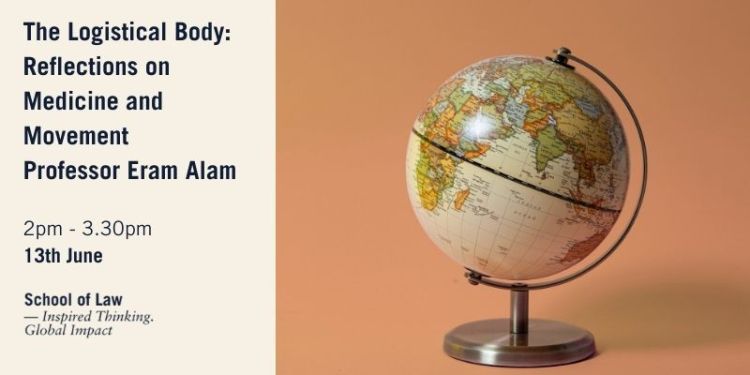The Logistical Body: Reflections on Medicine and Movement

- Date: Friday 13 June 2025, 14:00 – 15:30
- Location: University of Leeds
- Cost: Free
Join LSJ and Eram Alam to explore the idea of the “logistical body”— how people are increasingly treated as units of movement in a world driven by supply chains, markets, and transnational systems.
Abstract
This paper theorizes the concept of the “logistical body” – a human subject shaped by and subjected to the logics of global circulation. It traces the historical origins of modern logistics through the slave trade, colonial trading companies, and military operations, showing how logistics transformed from a mode of supply coordination into a pervasive structure of power that disciplines time, space, and bodies. Working with Foucault’s concept of biopolitics and Agamben’s notion of bare life, the paper argues that logistical power operates differently: not by optimizing life or excluding it, but by rendering bodies into mobile, modular, and depersonalized objects of movement. Through the case study of medical tourism, the paper illustrates how sick or injured individuals become mobile units in a privatized, globalized healthcare economy. The logistical body, unlike the biopolitical subject, is not managed by a state but by market actors and transnational systems – raising new questions about sovereignty, care, and embodiment in late capitalism.
About the Speaker
Eram Alam (Harvard University, Department of the History of Science) specializes in the history of medicine, with a particular emphasis on globalization, race, migration, and health during the twentieth century.
Her first book, The Care of Foreigners, explores the enduring consequences of post-colonial physician migration from Asia to the United States. Since at least the 1960s, the US has trained fewer healthcare providers than it needs, relying instead on the economically expedient option of soliciting immigrant physicians. Initiated during the Cold War with the passage of the Hart-Celler Immigration and Nationality Act of 1965, the arrangement was conceived as a temporary stopgap. However, it has since become a permanent feature of US healthcare with immigrant physicians comprising at least a quarter of the physician labor force to date. The entanglement between immigration, foreign policy and US healthcare has perpetuated a segmented system whereby foreign physicians are directed to care for vulnerable patients in under resourced communities throughout the country. The Care of Foreigners foregrounds global dynamics embedded in the medical system to ask how and why Asian physicians – and especially practitioners from South Asia – have become integral to US medical practice and a ubiquitous presence in mainstream mass media.
Alam’s next project The Logistical Body was motivated by the pandemic and the subsequent breakdowns it made visible. Contemporary logistics is an attempt to master time and space to generate efficient, unimpeded movement. However, as we collectively witnessed, disruptions are inevitable; environments, nature, and uncooperative labor regularly threaten smooth operations forcing logistics to confront its limits. The Logistical Body investigates one limit – the material remainder of the laboring body within this hypermobile regime – and excavates the strategies, techniques, and logics used to manage this disordered entity. Logistics has reshaped subjectivities by altering the temporality of the political and technical, producing new ways of thinking and seeing, and compelling novel modes of care.

